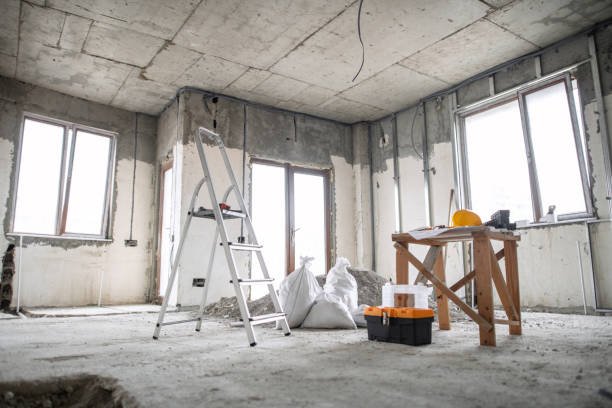When it comes to home maintenance, one of the most critical aspects often goes unnoticed: the foundation. The foundation is the bedrock of your home’s stability, and any compromise can lead to serious structural issues. One of the most insidious threats to a home’s foundation is a slab leak. Understanding what slab leaks are, how they can cause foundation damage, and how to prevent them can save you from extensive repairs and costly bills down the road.

What Is a Slab Leak?
A slab leak occurs when a water line beneath your home’s foundation leaks. This can happen for several reasons, including corrosion of the pipes, shifting soil, high water pressure, or even poor installation. When water seeps through the concrete slab, it can cause extensive moisture damage, leading to problems such as mold growth, decreased indoor air quality, and, most critically, slab leak foundation damage.
How Slab Leaks Affect Your Foundation
The consequences of a slab leak can be severe. As water continuously seeps through the foundation, it can erode the soil supporting your home. This erosion can lead to settling or shifting of the foundation, resulting in cracks in the walls, uneven floors, and in severe cases, structural failure. Homeowners might notice signs of slab leak foundation damage, such as:
- Cracks in Walls or Floors: Diagonal cracks in walls or noticeable gaps between the walls and floors can indicate shifting due to water damage.
- Wet Spots or Puddles: If you notice wet spots on your floors or puddles around your home’s foundation, it may indicate a leak.
- Unexplained Increases in Water Bills: A sudden spike in your water bill without any change in usage can be a telltale sign of a hidden leak.
- Mold and Mildew: Excess moisture can promote the growth of mold and mildew, leading to health risks for you and your family.
Prevention Strategies
Preventing slab leaks is crucial for maintaining the integrity of your home’s foundation. Here are some strategies to help you avoid slab leak foundation damage:
Regular Inspections
Regularly inspect your plumbing system and foundation. Look for any signs of water pooling, damp spots, or discoloration on your floors. Early detection of leaks can save you from extensive repairs later on.
Monitor Water Pressure
High water pressure can stress pipes, leading to leaks. Use a pressure gauge to monitor your home’s water pressure. Ideally, it should be between 40-60 psi. If your pressure exceeds this range, consider installing a pressure regulator to protect your plumbing system.
Control Moisture Around the Foundation
Ensure proper drainage around your home to prevent water from pooling near the foundation. Use gutters and downspouts to direct water away from your home, and consider installing a French drain system if necessary. Keeping the soil around your foundation consistently moist (but not overly saturated) can also help prevent shifting and cracking.
Be Mindful of Landscaping
Trees and shrubs planted too close to the foundation can cause damage to pipes. The roots can infiltrate plumbing lines, leading to leaks. When landscaping, ensure that plants are kept at a safe distance from your home’s foundation, and consider root barriers if necessary.
Upgrade Old Pipes:
If your home has older plumbing, consider upgrading to modern materials like PEX or copper. These materials are more resistant to corrosion and damage compared to older galvanized pipes. Investing in newer piping can reduce the risk of leaks.
Insulate Pipes
Insulating your pipes can protect them from extreme temperature fluctuations, which can cause pipes to expand and contract, leading to cracks and leaks. Insulation also helps in maintaining the temperature of the water flowing through the pipes, reducing the risk of freezing during cold weather.
Install a Leak Detection System
Modern technology can help you monitor your plumbing system. Installing a leak detection system can alert you to potential leaks before they escalate into larger problems. Many systems can connect to your smartphone, allowing you to monitor your home while you’re away.
Educate Your Family
Ensure that everyone in your household understands the signs of a slab leak. Educating your family on what to look for can help catch issues early. Encourage them to report any unusual signs, such as the sound of running water or a sudden increase in humidity.
Work with Professionals
Having a trusted plumber or foundation specialist regularly assess your home can be invaluable. They can perform inspections and provide recommendations tailored to your specific situation. Professionals can also conduct more complex solutions, such as pressure testing and sewer line inspections.
Maintain Regular Maintenance
Routine maintenance is essential for preventing slab leaks. This includes checking seals on appliances, ensuring that hoses are not worn or damaged, and monitoring your water heater for any signs of corrosion or leaks. Regularly scheduled plumbing inspections can help identify small issues before they become major concerns.
Slab leaks pose a significant risk to your home’s foundation, leading to costly and extensive repairs. By implementing preventive measures and maintaining vigilance, you can protect your home from slab leak foundation damage. Regular inspections, controlling moisture, monitoring water pressure, and working with professionals are all crucial steps in safeguarding your property. Remember, the best defense against slab leaks is a proactive approach that prioritizes the health of your home’s foundation. Taking these steps will not only enhance your home’s longevity but also provide peace of mind for you and your family.